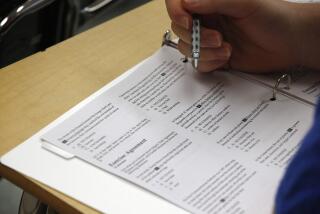Sharing Secrets
- Share via
Angel Iglesias leaned his head against a wall of the cramped, sweaty classroom in the Shalimar Learning Center, groaning to himself as if he had just fallen for the most stupid joke ever told.
The 18-year-old’s mistake was a typical misstep on the SAT. He tried to use algebra to answer a question instead of using one of the famous “tricks” that help thousands of students raise their scores by hundreds of points. In this case, he should have tried plugging the multiple test answers into the formula to see which one worked instead of wasting precious seconds figuring it the long way.
“This is so easy,” he says to himself. “A moron could do it!”
The nine other students in the room could sympathize.
They’ve all done the same thing. And since most of their parents have not attended American schools, they can’t expect much insight on the nuances and intricacies of the SAT from home, even if they are embraced by waves of moral support.
That’s where David Benjamin, owner of “Head of the Class” prep courses, comes in.
The 38-year-old musician and tennis player makes his living from the SAT prep industry, attracting students able to pay $550 for a 20-hour course. The vanity plate on his Ford Mustang pronounces him “DR. SAT,” and business is booming enough that he has to work only four months out of the year. But he’s earned enough to volunteer his expertise in low-income neighborhoods across the Southland.
Last month, he started driving to the Shalimar center in Costa Mesa to help Latino students. Nationwide, Latino students on average score about 60 points below white students, according to the College Board, which administers the SAT.
Although he moved to Los Angeles from Massachusetts 11 years ago on the promise of a record contract, he soon discovered that prepping for the SAT was a very lucrative field. After working for the more well-known Kaplan Education and Princeton Review SAT classes, which can charge up to $700 or more, Benjamin branched out on his own, relocating to Irvine four years ago.
He recently started volunteering at the Shalimar Learning Center, eager to expand his efforts to Latino students whose parents speak Spanish. He has high hopes for their success.
Given the Latin base of most Spanish words, he believes his students may have an even greater advantage in figuring out the roots of unfamiliar English vocabulary.
“My theory is that [low scores] are not because they’re Latino, but because they haven’t been shown how to do it,” Benjamin said. “The most basic thing is that nobody has ever told these kids how Spanish relates to English. Or the concept that you don’t have to do things a fixed way--you just need to find the right way.”
Benjamin’s method, which he has baptized “realogics,” actually applies to all of his students. At base, his philosophy presumes that school relies on memorization for success instead of reasoning and logic--the skills demanded by the SAT. While school-based knowledge is crucial in many ways to scoring well, it is not the only resource to get you through the three-hour exam.
“My theory is that the SAT has nothing to do with school,” said Benjamin, who considers himself something of a natural at test-taking. “They do intersect, but they are two different things.”
The clues students need to get the right answers are all around them, he tells his classes. They are on television commercials and in the polysyllabic commentary of sports broadcasters. It’s just a matter of observing all of that popular culture--schlock and otherwise.
Stuck on somnambulist, for instance? Think about Unisom, Sominex and all those other over-the-counter sleep aids from prime-time ads. You know the root of that word is somnus, or sleep. Same with the ever-present Aleve. The pills alleviate pain.
The process of reasoning and logically applying what you know--whether that comes from books or the street--can actually aid you all through life, Benjamin said.
“Everybody says the SAT is a bad test, and you can beat it,” he says. “I tell them that it’s a good test, and it can impact you permanently. They can learn from it.”
The first batch of practice test results from Benjamin’s Shalimar class show student scores went up by about 100 points. Most of the students took their first SATs June 6 and will receive their official results in a few weeks.
“They’re very much pioneers,” said Kristina Wright, a former English teacher and executive director of the center. “This is the first kind of class of this kind we’ve been able to offer to our students. It’s pretty common knowledge that when students take this exam, very few take it cold. We want to provide them with as much assistance, guidance and mentoring as possible.”
Wright said Benjamin’s method also appeared to help the students realize they knew a lot more than they thought they did, giving them a shot of confidence. “It surprised them,” she said.
“I thought it would be like school, just review, but it’s not,” said Claudia Flores, 15, a student in the class. “He makes you think in different ways.”
Benjamin adds that if private teachers would give their time to the less affluent, then more scores might be raised.
“We make really great livings,” he said. “But it’s not fair that we only work with kids who can afford it.”
(BEGIN TEXT OF INFOBOX / INFOGRAPHIC)
For those facing the SAT without the aid of preparatory classes, test-taking expert David Benjamin offers five key points to remember:
1. Practice makes perfect (or at least better). There is no ceiling on improvement. Get a book with practice tests and do them until you’re comfortable with the format.
“The practice tests are written by the same people who write the real tests. The more you practice, the better you do.”
2. Learn the math behind the “correction factor.” SAT graders give you one point for a correct answer and deduct a quarter of a point for an error. This seems to indicate that you should not guess, but if you can rule out even one of the given answers, go for it.
“As long as you can eliminate any answer, you are ahead of the correction factor. You should be guessing.”
3. Be in tune with your own knowledge. Benjamin’s “Realogic” concept assumes that your own experiences and culture contain clues to answers: i.e., if you can figure sports scores, you can also tackle SAT math. Sift through words you’ve heard on television and in product advertisements to deduct word roots.
“ ‘Pepto-Bismol’ refers to peptic, or digestion. All these things are named for a reason.”
4. Nurture yourself and adjust your attitude. Treat the exam like an athletic event. Get one, preferably two, nights of good sleep and avoid parties for a few days. Eat carbohydrates and stick with light foods.
“This is not the day to discover meat.”
5. Focus on the prize. Envision that college acceptance letter.
“With some of these kids, every 20 seconds they are thinking about the fight they had with their boyfriend. The key thing is to block all that out.”
More to Read
Sign up for Essential California
The most important California stories and recommendations in your inbox every morning.
You may occasionally receive promotional content from the Los Angeles Times.










